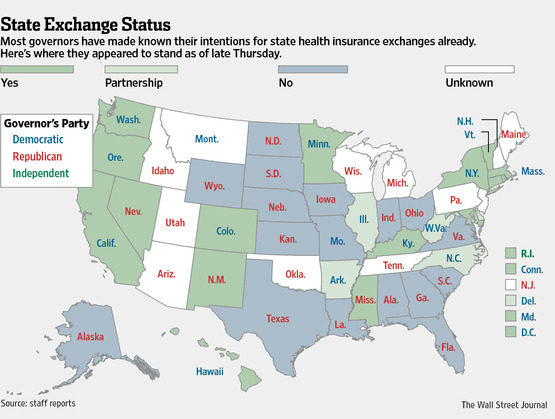Health Insurance Exchange Deadline Delayed


States will have now until December 14th to decide if they want to have a state run health insurance exchange or not. This extended deadline comes from the fact that many states have simply not yet made their decision.
The Health Insurance Exchange is a key piece of Obama's health care reform, the Affordable Care Act, that should give health insurance to more than 30 millions uninsured Americans. The Health Exchange provision will create a one-stop shop where individuals and small businesses will be able to efficiently compare and buy health insurance. These exchange, run through states, will also help people determine if they qualify to receive subsidies from the federal government based on their incomes.
"Exchanges have to certify that health plans offer required benefits, and be able to determine who is and isn't eligible for financial help. And most of all, they have to be able to help consumers," summarizes Karen Pollitz, a former Obama Health Administration official.
Under the ACA, these health exchange centers have to be created, either as a agency or non-profit, and be ready to sign people by October 2013. These exchange centers will take the form of online websites, toll-free 800 numbers, and other assistance programs.
States have three options to perform this requirement. They can create a state run health exchange that they will run independently, while respecting federal rules. They have until December 14th to chose to do so and demonstrate how they will organize this exchange. If they refuse to do so or miss the deadline, the federal government will step in and run the exchange. As a third option, states have until February to choose a partnership between the state and the federal government to run the exchange.
So far, 13 Democratic states and Washington, D.C. have announced their intention to create a state run exchange. Among Republican states, the decision has been difficult; many are torn between applying a law they do not support or going against their traditional position of limiting the federal government's intervention in state business. For example, Mississippi Insurance Commissioner Mick Chaney, a Republican, believes that the state would be better off running its own exchange.
This was the main topic of discussion at the Republican Governors Association meeting in Las Vegas this week, and it is clear division remains on how to approach the issue. With one more month to decide, states should have enough time to deepen their knowledge of the ACA requirements and make an informed decision on how to execute the exchange programs.
Credit: Wall Street Journal



